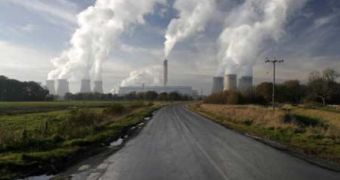Japanese carbon dioxide emissions increased by 2.3 percent over the year ending March 2008, which means that the nation failed to respect the obligations it committed to through the Kyoto Protocol. The document is an agreement between several countries, stating that, by 2012, greenhouse gas (GHG) emissions must drop to the levels they were at in 1990. With only 3 more years to go, and 8.7 percent increase from the levels in the benchmark year, Japan is highly unlikely to be able to respect the deal.
Government officials mostly attributed the increase to the fact that the largest nuclear power plant in the world had to be shut down, following a major earthquake that hit the northern regions of the country. Japan is heavily reliant on nuclear energy, with almost one third of its grid being fueled by electricity produced via fission.
"The greater use of thermal power plants due to reduced nuclear power operations significantly contributed to the increase," announces a Japanese official, with the Environment Ministry. The country also relies heavily on fossil fuels for electricity production, mainly on coal. It's common knowledge that coal releases enormous amounts of carbon dioxide while it's being processed. Once emitted into the atmosphere, the chemical contributes to an ever-increasing greenhouse-effect worldwide.
The UK, Germany, Canada, Italy, Japan, France, Russia and the United States are the current members of the Group of Eight (G8) rich nations, a group that has been deciding the fate of the world behind closed doors for several years. G8 leaders called for a meeting in July of next year, on Japanese soil, in order to discuss the reduction of carbon dioxide levels by some 50 percent until 2050. However, the benchmark year has not yet been published.
For now, most countries are considering the draft of what will become the next international protocol on the matter, when the Kyoto agreement expires. After 2012, nations are considering making documents enforceable, in that they will no longer be guidelines, like now, but, rather, will enable the UN and other international organizations to apply sanctions to countries that do not respect the agreements they signed.

 14 DAY TRIAL //
14 DAY TRIAL //